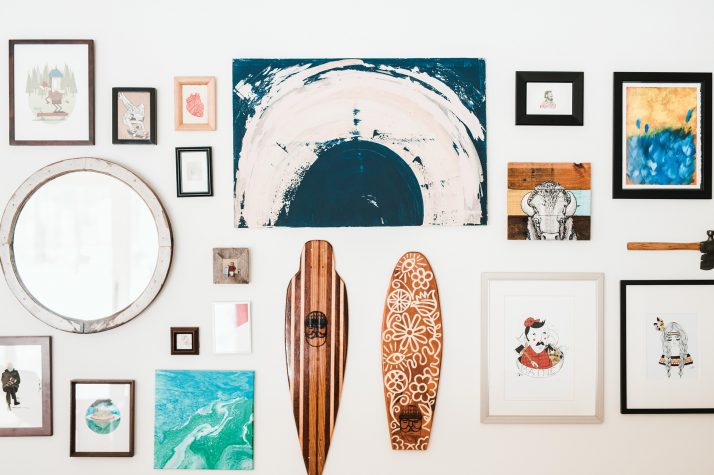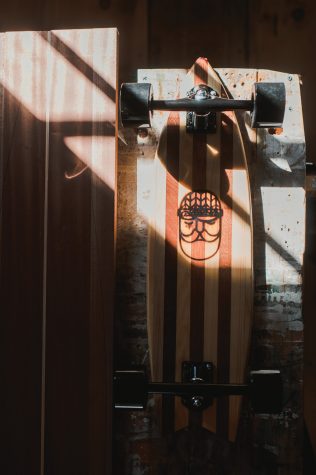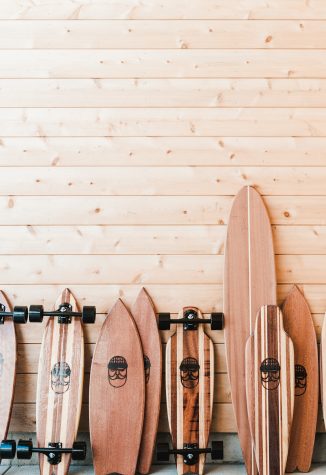Sweet Ride
Made of junk wood and crafted by hand, Billy Landenberger's longboards bring a West Coast sensibility to the Maine streets.
When Billy Landenberger was growing up in Attleboro, Massachusetts, there “wasn’t really a longboard scene.” But when it comes to chasing adrenaline, it doesn’t take much to get a teenager’s gears turning. A few of his friends built a half-pipe, and that was it. After school, he’d skate over on his longboard to practice. He doesn’t remember what kind of board it was, but it was cheap and old-school. “What I remember most vividly,” he says, “is the hill. There was this huge hill, and I remember flying down it, completely out of control. I fell in love with that—going real fast, having this individual sport.”
As a kid, Landenberger had been pushed to play team sports, and while soccer and baseball have their upsides, they weren’t his passion. It’s not that he wanted to be left alone; he was thrilled to discover there was a big wide world of skaters out there. Yet he didn’t embrace the sport with his whole heart until much later, when he started Sad Lumberjack. Building longboards changed his relationship to skating, to making, and to being outdoors.
It all started when he moved to Maine and found himself with a little free time on his hands. Landenberger usually spent his summers fixing up his home, but in 2014 he found himself finally living in a place that didn’t need much work. He needed a small project, and he remembered that hill, the feeling of flight. What if, he thought, he used his carpentry skills to make a longboard? “I started with pallets, old shipping pallets,” he remembers. “I’d pull apart anything I could get my hands on. There was an old cedar fence on the property, and I took that apart, milled it, and made a board.” His customers arrived by word of mouth at first, then later they found him online. Not everyone understands the name right away, but Landenberger is willing to explain: “The lumberjack’s sad because he doesn’t have any work,” he says with a laugh. No trees are cut down to make Landenberger’s boards.
He uses all hardwood, all of it secondhand. Sometimes he gets scrap lumber from his own projects, but more often than not, it comes to him from a local furniture maker. He takes scrap wood and “stuff that otherwise would burn” and mills it, planes it, glues it, clamps it, and lets it dry. “I use a planer that runs the whole board through so it’s nice and flat,” he says. “Then I shape it, however the customer asks. A pintail or kicktail. Then there’s the messy part of making sure the edges are smooth.” His process involves “a ton of clamps,” a jigsaw (“a bandsaw would be better, but I don’t have that,” he says), and several kinds of sanders. He does it all from his home studio, located adjacent to his stylish, energy-efficient Arundel home. He’s been so successful that he recently had to make a decision: go full-time, or scale back.
“It was getting to the point where it was basically another full-time job,” he says. “I never really thought that would happen. I couldn’t keep up with the orders that were coming in. I felt bad. So then I let the stock go down, and I went back to relying on word of mouth, or messages on Instagram. It takes a lot of time and effort to do it and to do it right. I didn’t want to give that up.”
He didn’t, nor did he give up his job teaching physical education at a middle school. Where other people might have chosen to scale the business up and let quality suffer, Landenberger just couldn’t. He still makes boards by commission, and he still gets up every morning to make sure his students are staying active and healthy.
Because that’s the ethos at the core of Sad Lumberjack and, more important, Landenberger’s life. As a father of three and a longtime educator, he spends a lot of time thinking about what makes a healthy childhood. It’s about being outside, moving your body, and spending time with family. “My goal is to have time to spend with my kids, going surfing, riding our boards,” he explains. Their family lives near Gooch’s Beach in Kennebunk, and a favorite weekend activity is grabbing the kids, grabbing a board, and cruising along the water. His kids use some of the first boards he ever made. It’s “super gratifying” to get glimpses of his teens and their friends longboarding down the street, even in the dead of winter. “I started this because I needed a hobby, but I keep going because I love it,” he says.
Landenberger also wants to keep the planet healthy by using every scrap of wood that comes his way. It’s something his customers value. “They’re sustainable, they’re made in Maine, and every one of them is unique,” he explains. “People like that. It’s unlike what you would buy in a skate shop, where all the boards are made of plywood.” His boards are heavy, but they last forever, which means less trash in landfills. “There’s a market for my kind of thing, things that are made by your neighbor, your friend, someone in your town,” he adds. While there are other people doing similar work on the West Coast, his one-man company is a rarity in New England. But Maine, he says, is different from anywhere else. People here get it. “They see the point,” he says. “They see they’re beautiful, but they’re also made of trash.”











